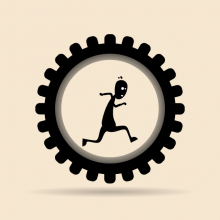building social movements

WE KNEW THIS would be hard. But as the litany of harms rolling out of the White House grows, so has the creeping sense that our efforts to help are inadequate. Sure, we may know the drill to counter these assaults on people and our civic norms: Contact elected officials, offer support to those most impacted, donate, pray, take breaks, and jump back in. But in the face of an administration increasingly comfortable with authoritarian tactics — spreading disinformation, expanding executive power, silencing critics, scapegoating minority communities, detaining and deporting immigrants with no due process, and hamstringing independent institutions — is any of it really enough?
In early April, Sojourners editor in chief Betsy Shirley took these questions to Jarvis Williams, a pastor-turned-pro-democracy-organizer who shifted careers after recognizing that many of the prayer requests his congregants whispered to him were rooted in pain stemming from public policy decisions. His desire to respond eventually led him to join the Horizons Project, a nonprofit that aims to strengthen the ecosystem of different groups working for social change, including veterans, Indigenous organizations, faith communities, racial justice activists, union members, and business leaders. In their conversation, Williams shared his strategies to avoid feeling overwhelmed, insight about where Christians can make the most impact, and some pastoral tough love for those of us prone to forget that America’s problems didn’t start with a particular politician or election cycle. — The Editors
Betsy Shirley, Sojourners: As a pro-democracy organizer, how would you describe what’s happened in the U.S. in the past few months?
Jarvis Williams: If I’m talking with Christians, I would talk about the inability of us as a political community to demonstrate equal concern for all people. We have forgotten how powerful sharing is. We have created a political demonstration of the refusal to keep striving to share what we have.

In July 2010 I joined with around 100 freedom fighters in Chicago, many of whom had traded the previous year of their lives to fight for comprehensive immigration reform. And we knew it was not going to happen in 2010, at least as we had imagined. Many in the room were exhausted, and defeated, and spent. The response from the campaign was to talk about the next hill to climb rather than deal with the pain and exhaustion in the room.
Doing justice is hard and exhausting work. We are compelled to action by the urgency of the suffering and pain and evil that mark life for so many in God’s world. And the work is never done. Win or lose, there is always another hill, another peak, another challenge that lies ahead. So the temptation is to keep on keeping on, and to rise to the next challenge.
For the past 20 years, I have either been a pastor or a community organizer, and for many of those years I have been both. For pastors and organizers, there is always one more email to write, one more call to make, and one more strategy to be explored. To be blunt, burnout and exhaustion are the order of the day.